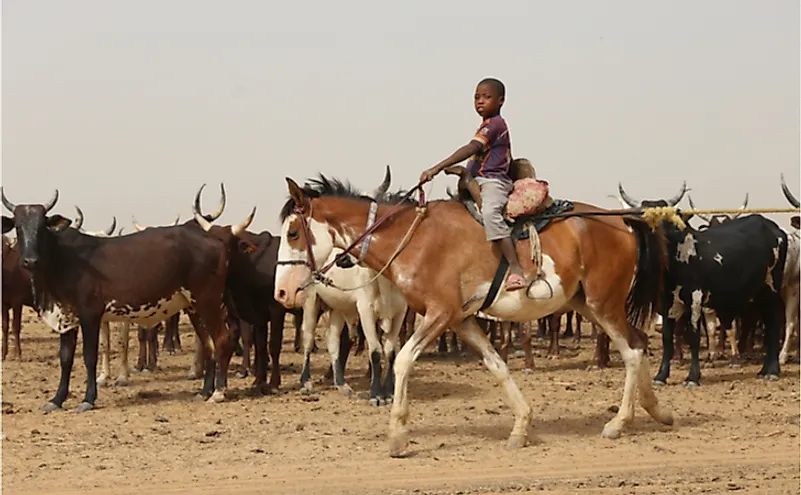8 Interesting Facts About Chad

The Republic of Chad is a landlocked country in Africa. It is sandwiched between Libya, Sudan, Central African Republic, Cameroon, Nigeria, and Niger. The country is named after Lake Chad, which is the largest wetland in the country. N'Djamena is the largest and capital city. There are over 200 ethnic and linguistic groups in the country, but Arabic and French are the official languages. France colonized Chad in1920 as part of French Equatorial Africa, but it gained independence in 1960. Soon after, a civil war erupted, followed by a series of coups. The Darfur Crisis in Sudan spilled into Chad, sending thousands of refugees across the border. Although the country claims to hold democratic elections, it is plagued by persistent political violence and civil wars that have resulted in abject poverty and corruption. The following are some interesting facts about Chad.
Grains Are The Staple Food In Chad
Grains, including sorghum, millet, and rice are the staple food of the country. Most people eat a dish that contains grains at least once a day. Boule, one of the most popular dishes in the country, is made from sorghum or millet and resembles porridge. Grains are a staple because most people engage in subsistence farming, and a large percentage of the country is arid or semi-arid.
Chad Has Three Climatic Regions
The Sahara Desert covers northern Chad, which is about a third of the country's area. The Sahara is the world's largest hot desert and is sparsely populated. The Sahel belt, which stretches from Senegal in the West to Egypt in the east, covers the entire Central Region of Chad. This is the transition point where the desert meets the tropical climate of the South. Southern Chad experiences a tropical climate that supports farming and provides a conducive environment to settle and is, therefore, the most densely populated region of the country.
Rich Country Poor People
Chad is one of the poorest countries in the world. It has experienced political instability since its independence in August 1960 and is currently fighting terrorism linked to al Qaeda and ISIS with the aid of French troops. It has poor education and health systems. All this is brought about by corruption, mismanagement, and poor governance. Nevertheless, the country holds vast reserves of oil, uranium, and gold. Poor infrastructure and a lousy business climate have turned away potential investors.
Chad Is Named After Lake Chad
Chad is named after Lake Chad, which is the largest wetland in the country. The lake is of great importance to Chad, Nigeria, Cameroon, and Niger. It varies in size depending on the season, but on average, it has shrunk by 95% compared to the early 1960s. The native population called the region Chad, a name that was adopted by the Europeans to refer to the entire country. The lake is a remnant of the paleolake Mega-Chad, an inland sea that existed before 5000 BC and was larger than the Caspian Sea.
The Lion And The Goat Are The National Symbols Of Chad
The national symbols of Chad are the lion and the goat. The goat represents the northern part of the country while the lion represents the South. The symbols are featured on the coat of arms where they stand on opposite sides, separated by a yellow and blue shield with a red sun rising above it. The national motto, Unité, Travail, Progrès, translates to Unity, Work, Progress.
Chad Is The Babel Tower of the Modern World
Chad is culturally and linguistically diverse. It is known as the Babel tower of the modern world since it has more than 200 ethnic groups and more than 100 languages. Arabic and French are national languages, but a majority of the population speaks two or more languages.
Camel Racing Is A Popular Sport In The Tibesti Mountains
The Tibesti Mountains are home to the Toubou tribe (mountain people) who engage in camel racing as a sport. Competitions are held occasionally to determine the village champions. Tourists from across the world visit the mountains purposely to participate in camel racing.
Mastering The Kakaki Instrument Commands Respect
The kakaki is a musical instrument with a long metal trumpet that is used by the local population during traditional ceremonies. It signifies power, and whoever masters its rhythms commands respect in society. The kakaki is indigenous to the Hausa people who are also found in Nigeria, Burkina Faso, Ghana, Niger, and Benin.











